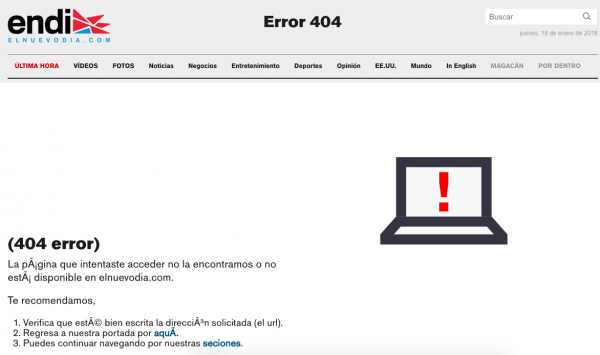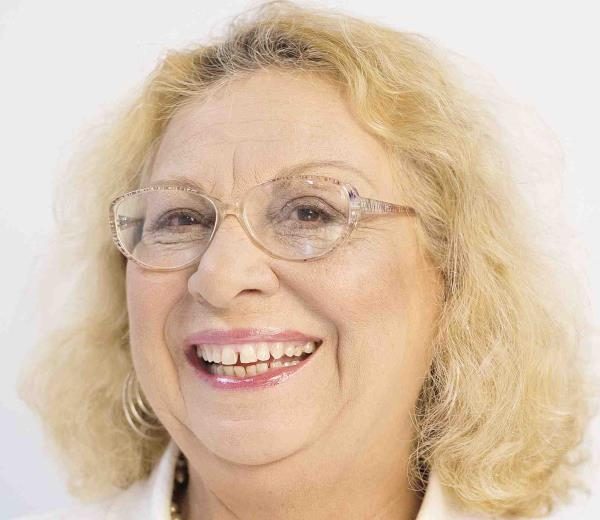On January 8, El Nuevo Día, Puerto Rico’s largest newspaper, published a opinion piece by Wilda Rodríguez called, “¿Qué quiere ‘el judío’ con la colonia?’ (“What does ‘the Jew’ want with the colony?”). The piece (which is no longer on END’s site) was widely condemned by Puerto Ricans on the island as well as organizations like the Anti-Defamation League.
Here is part of what the column said in Spanish:


On Wednesday, the newspaper issued a lengthy apology on its site:
After a process of introspection, reflection and analysis, this newspaper understands that the column written by Wilda Rodríguez, entitled “What does ‘the Jew’ want with the colony?” published on January 8 in the Opinion pages of El Nuevo Día is contrary to our publishing policies because its content appeals to prejudiced and anti-Semitic feelings and attitudes.
We deeply apologize to the Puerto Rican and international Jewish community for the publication of that column, which has been removed from our website. Neither our company nor the family that runs it share the personal opinion of the columnist.
El Nuevo Día aspires to be a pillar of freedom of expression in our democracy. Above all, we respect the dignity of every human being and the diversity of ideas. But freedom of expression comes with responsibilities. Freedom of expression and press freedom should not be vehicles that promote discrimination. Our mission is to work towards a more broad-minded and unbiased society, where open dialogue prevails. The unfortunate experience of the publication of the column and the numerous voices that have protested against that publication have led us to a serious process of reflection. The lesson has been learned.
The Anti-Defamation League, in reaction to the publication of the column, exposed it in the following way in a statement already published on our platforms: “This is not the first time that confronted with an economic crisis Jews are accused of controlling the power and money.” The statement adds that the column “follows the worst legacies of anti-Semitic regimes that we would like to have left behind in the 20th century.”
The Puerto Rican experience with our Jewish community has always been very positive. In fact, after Hurricane Maria hit Puerto Rico, the Jewish community on the island, together with the Jewish community of the United States, moved quickly and decisively to help us in the time of our greatest need in more than a century. Israel has quietly sent air aid as well as rescue workers and medical personnel, in addition to assist in the reconstruction of houses on the island.
In Congress, the voices of Senator Charles Schumer, New York, and Bernie Sanders, Vermont, joined Puerto Ricans Nydia Velázquez and Luis Gutiérrez when requesting help for American citizens of Puerto Rico.
They are gestures of solidarity and humanity that we appreciate. They have done more to help Puerto Rico after the hurricane than Senators Marco Rubio, Orrin Hatch or Speaker Paul Ryan.
The problem of Puerto Rico has nothing to do with the Jews. We Puerto Ricans are responsible for being where we are: among other things, for accepting corrupt politicians, for allowing nepotism and for being indifferent to the inefficiency of the government. We are where we are for tolerating a government that spends more than it has and that has mortgaged the island for generations and a Congress that cares very little about what happens to Puerto Rico. That is the reality. It has nothing to do with being Jewish.
Learning from our mistakes are lessons that make us better human beings. That is what we will do by opening an open-minded conversation and accepting our responsibility: the column should never have been published.
This is what happens when people access the column now:


Meanwhile, Rodríguez continues to defend her initial anti-Semitic column with (wait for it), more anti-Semitism, as she writes in a public Facebook note in Spanish. (If you want to read it in Spanish, go here, but the quick summary is this: Rodríguez has yet to apologize and is using the excuse that she has always be fascinated by why Jews are in power positions in the United States.)


Wilda Rodríguez
And while Rodríguez’s column is now scrubbed by El Nuevo Día, an English version created by the National Institute for Latino Policy (NiLP)’s Angelo Falcón can be accessed here. (And spare us the claim that the piece is not anti-Semitic. It is.)
In that same NiLP post, Falcón wrote this:
While we can attest to the fact that Wilda is not an anti-Semite, it is hard for us to justify her equating the centers of U.S. power with the Jewish people. This is not to say that the Jewish community has not become a powerful force in American politics, as has the Israeli lobby, but it is a strategic error to adopt such stereotypes of American power that points one to the wrong target to focus on for change. Some Latinos resent the power that Jews exercise, especially in their support of Israel, while others are in awe of this power and seek to emulate it within the Latino community.
But Wilda Rodriguez’s use of this stereotype should be seen as unacceptable and an inaccurate characterization of American power. It promotes anti-Semitism and confuses which are the actual power centers that Puerto Rico has to address to end its colonial relationship with the United States.
Despite this, we still love and respect Wilda Rodriguez.
After reading BOTH the Spanish and the English versions, and seeing how Rodríguez won’t even follow El Nuevo Día‘s lead and offer a sincere “hey, I messed up and learned from all this” apology, we will say that one’s words reveal a lot. The column was an colossal problem, but it did reveal how some Puerto Ricans cling to bigoted beliefs that do nothing to further the dialogue. Blaming “the Jews” has led to some of history’s most horrific tragedies. It’s never a good idea to follow this path.
For example, we do wonder if Rodríguez even knows that anti-Semitism has made an ugly comeback under the rise of the alt right in the United States. Is that the audience Rodríguez wants to connect with?
So maybe Rodríguez should seriously reconsider her ridiculous defense and do the right thing: write a lengthy apology that is sincere and reflects that she has grown from all this. We understand that she made a mistake, but doubling down on that mistake makes no sense at this stage. It only makes Puerto Ricans look bad, and if she really cared about how Puerto Ricans are viewed in the world, Rodríguez should begin sharing her mea culpa right now.


